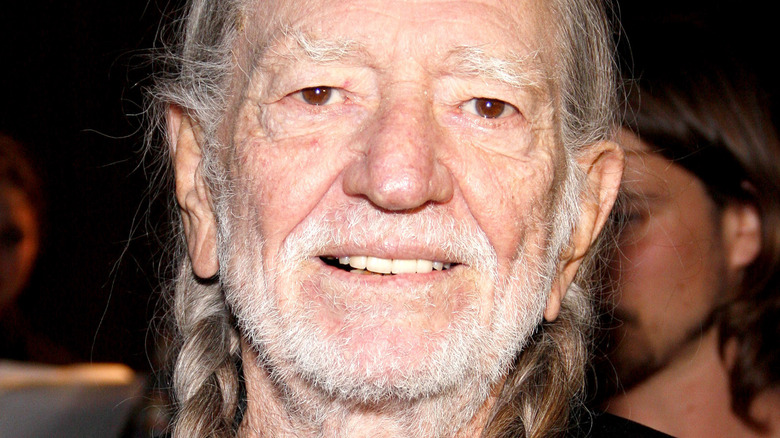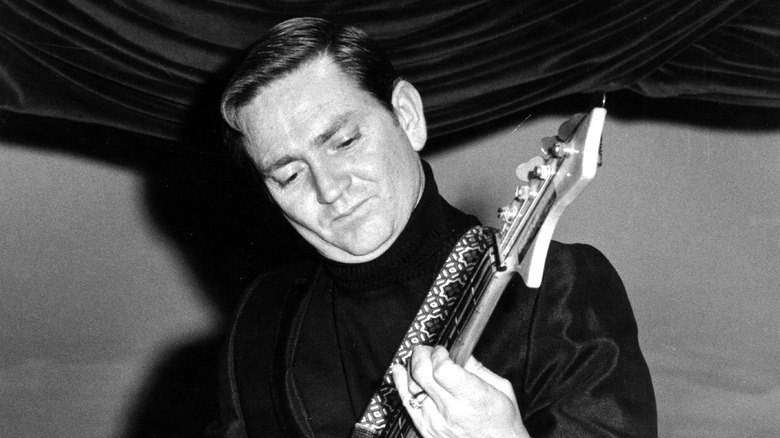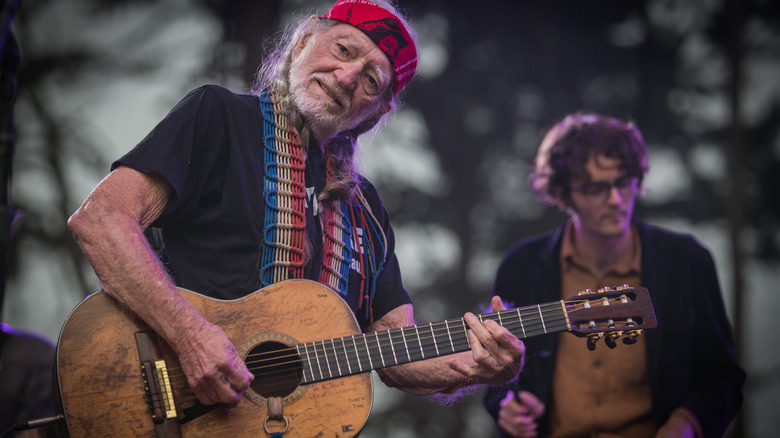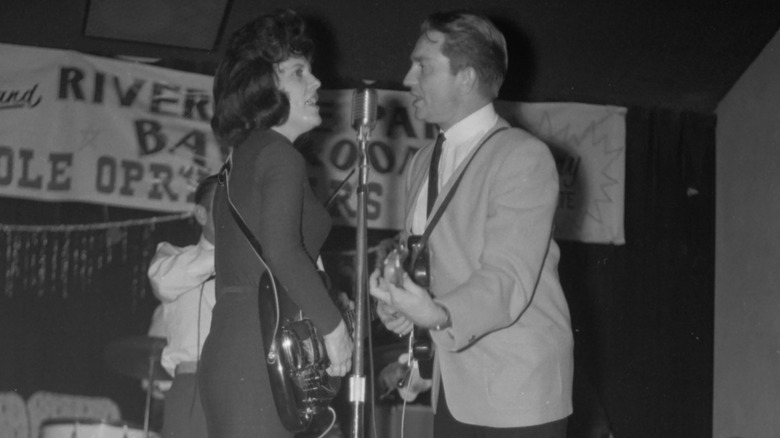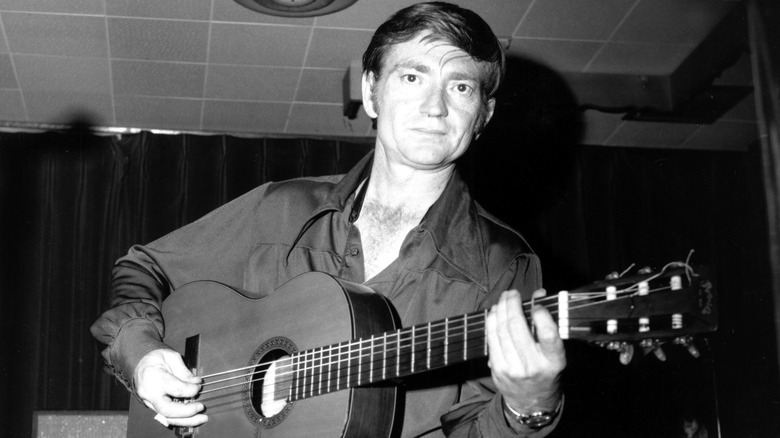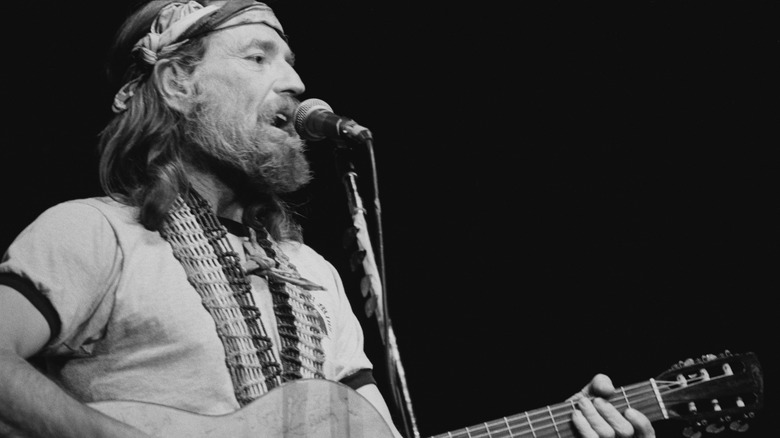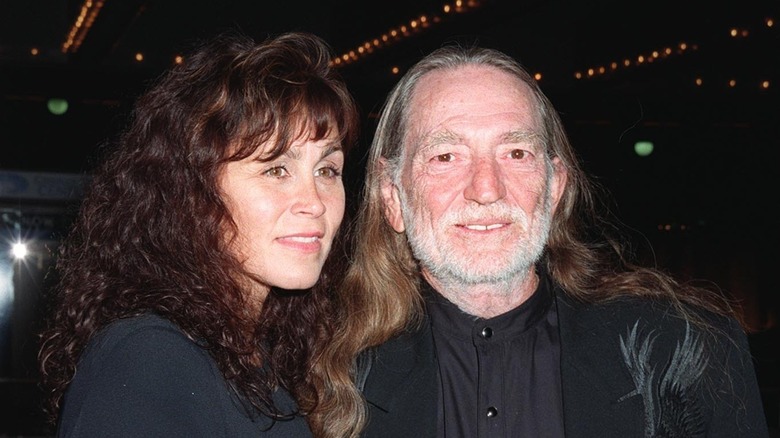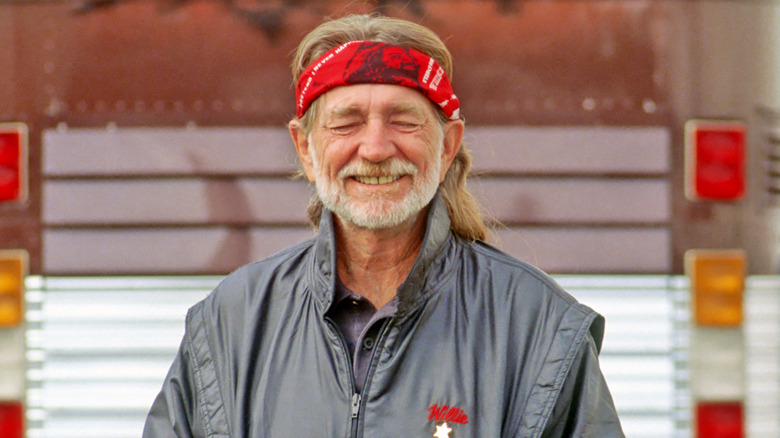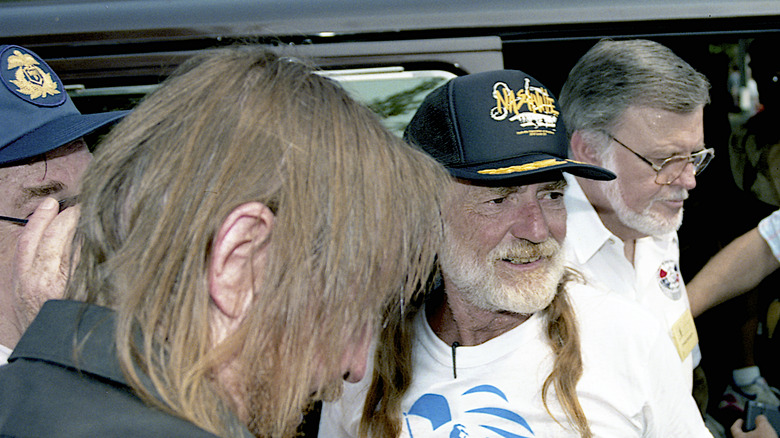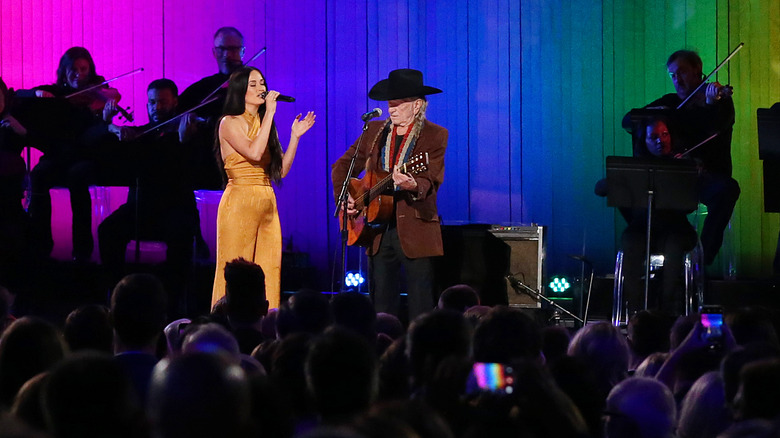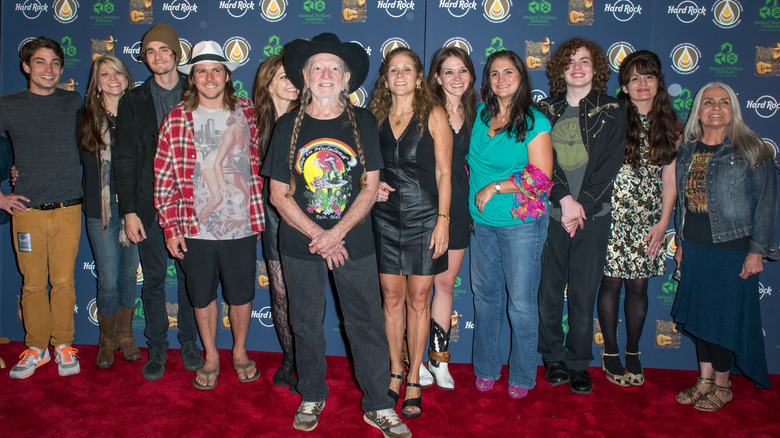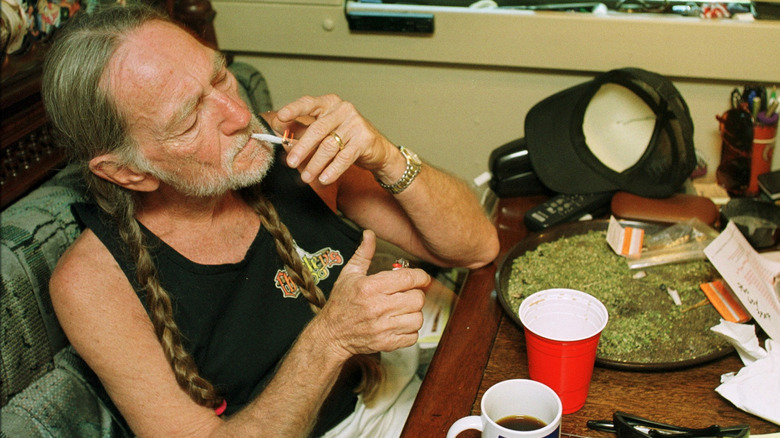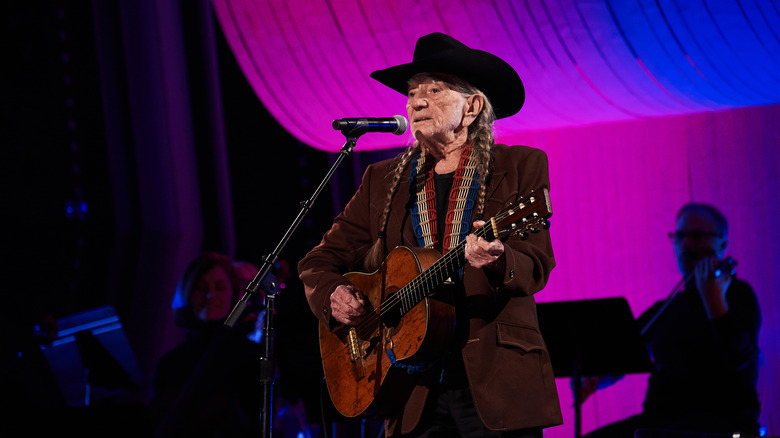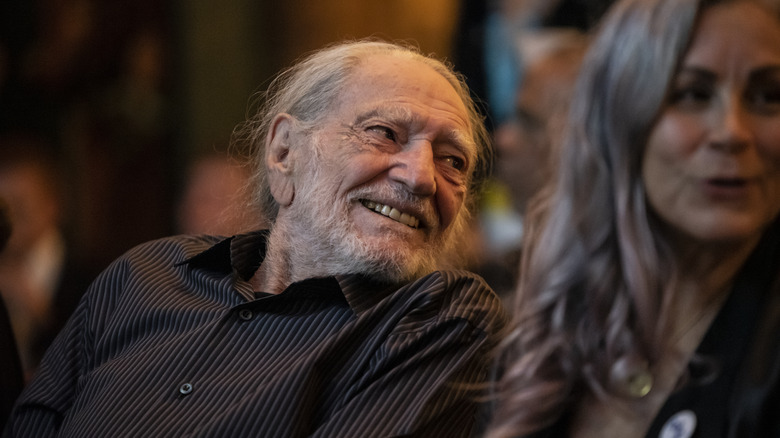The Untold Truth Of Willie Nelson
Willie Nelson is one of American music's most beloved icons. As the WSJ Magazine observed, he's taken home 10 Grammy awards, been awarded the Kennedy Center Honors, and sold over 40 million records over the course of a decades-long career. Oh, and Nelson's also reportedly worth at least $25 million.
But the musician came from humble Depression-era beginnings, raised by his grandparents in the small town of Abbott, Texas, after his parents divorced. "I can remember them sitting round the table at night beneath a kerosene lamp, studying their music, so I grew up with that, with people who took music seriously," he recalled in an interview with The Guardian. Nelson was also passionate about music: he wrote his first song at age seven and started playing guitar in nightclubs with a polka band at only 10. His grandmother, described by him as a "very, very hardcore, church-going Christian," was initially worried by the idea of him playing in nightclubs as a child. "When she heard I was going to play in a place six miles away, she said, 'You promised me you would never go on the road.' Six miles down the highway was on the road to her," Nelson said.
Since then, he's traveled a bit farther, having played everywhere from Alberta, Canada, to Rome, to Australia. But there's so much more to the singer/songwriter than just his prolific music career. This is the untold truth of Willie Nelson.
Willie Nelson sold encyclopedias door to door
Before making it as a country music star, Willie Nelson held down a lot of different jobs. Over the years, the musician worked as a radio DJ, a gas attendant, a factory worker, a manual laborer at a flooring business, and a door-to-door encyclopedia salesman — a job he eventually quit because of his conscience.
"Folks I was selling to were living in bare-bones apartments," Nelson explained to the The New Yorker. "Many were scraping by with hardly any food in the fridge. Then here comes this slick-talking Willie saying that, for only the daily price of a pack of Camels, the whole world of knowledge would open to them." He elaborated on his conflicted emotions over his cunning sales techniques to Interview, saying, "Those books were from $300 to $600. ... I felt a little bad about selling a $600 set of books to people who couldn't afford a couch."
The world of music opened up to Nelson after he sold his first song, "Family Bible," per The Guardian. Although he gave it away for only $100, this was enough encouragement for him to move to Nashville, the home of country music, and pursue his career seriously.
The true story of Willie Nelson's guitar, Trigger
One of Willie Nelson's most recognizable trademarks is his guitar, Trigger, which has been by his side for over 50 years. And as the country music star told Texas Monthly, the Martin N-20 found its way into his life at exactly the right time.
Nelson bought Trigger after his old guitar was trampled during a performance at the John T. Floore Country Store, in Helotes, Texas. "A drunk stepped on it," he recalled, adding that his friend Shot Jackson wasn't able to fix the instrument. Jackson did have another guitar that he thought Nelson might like, however, as he told the musician over the phone. The price was $750. "I had just bought a roping horse for seven hundred and fifty dollars," Nelson revealed. "So I said, 'That's pretty cool.'"
And although his solo career was struggling to take off at the time, it helped to inspire Nelson by reminding him of Django Reinhardt's jazz guitar technique. "When I found that guitar and amp, I knew that was the sound I was trying to get, that Django sound," he explained. He also eventually gave it a name inspired by another one of his influences. "I named my guitar Trigger because it's kind of my horse," Nelson told Rolling Stone. "Roy Rogers had a horse called Trigger."
Nowadays fans recognize the instrument by scratches and flaws, including a large hole by the bridge. "Trigger's like me. Old and beat-up," Nelson joked to Texas Monthly.
The mailman inadvertently ruined Willie Nelson's second marriage
Willie Nelson's personal life has been a rollercoaster, as he admitted in his memoir "Me and Sister Bobbie: True Tales of the Family Band." Per People, the singer shared how his second marriage came to a halt after his adultery was exposed.
While still married to the singer Shirley Collie (above left), Nelson fathered a child with Connie Koepke. And after their baby was born, his wife got an unwelcome surprise in the mail. "Shirley saw a bill from a Houston hospital. I tried to play it off as no big deal. I told her that I had to go to the hospital for something minor," the musician wrote, recalling the moment he was put on the spot.
"Shirley wasn't buying that for one simple reason: The bill said the charges were for the birth of a baby girl, Paula Carlene, born to a Mrs. Connie Nelson," Willie revealed, adding that he "couldn't lie" and "was caught flatfooted" by the bill. "Had to get the words out of my mouth. 'Connie's my girlfriend and Paula's our daughter.'" The musician later got a divorce from Collie and married Koepke in 1971.
Despite the turbulence of his personal life, Nelson tries to stay on good terms with all three ex-wives, telling The Telegraph in 2010: "Along the way you pick up wives and kids, and you are responsible for them. You don't discard them. There is no such thing as ex-wives, only additional wives."
The shocking reason Willie Nelson ran into a house fire
Although Willie Nelson has contributed many classic songs to the world, some of his creations will never see the light of day due to a house fire in 1970.
As the songwriter told People, the blaze destroyed over 100 of his own unrecorded tapes when his house burned down — but that's not the reason he ran into the fire. "By the time I got there, it was burning real good," Nelson recalled, "but I had this pound of Colombian grass inside. He went on to explain that he "wasn't being brave" by running into the house to fetch his marijuana, but that he was simply trying to cover his tracks. "I was trying to keep the firemen from finding it and turning me over to the police," the musician admitted.
By this point, he had already wasted a lot of time and money in Nashville trying to raise hogs. Losing his house to a fire was the breaking point for Nelson, so the unconventional singer decided to move. And so, as he would later tell Woody Harrelson during a chat for Interview, the ordeal would turn out to be a "blessing in disguise."
Willie Nelson almost quit music completely in 1972
Although Willie Nelson had success as a songwriter working for other musicians — for example, creating the world's biggest jukebox hit in Patsy Cline's "Crazy" — his own career was still stalled at the beginning of the '70s.
According to Folio, he offered up $14,000 to buy himself out of his contract with RCA Records, who had signed him up in the '60s, and retired to his home state of Texas. The Nashville music scene hadn't suited the long-haired Nelson and he was disheartened enough to consider quitting the industry for good, as People recorded. Instead, he set his family up in Austin and began touring local bars and venues in an old Greyhound bus.
Luckily, Texas turned out to be the heart of a new "outlaw country" movement and Nelson soon found himself working alongside fellow rebel artists Waylon Jennings, Johnny Cash, Merle Haggard, and Kris Kristofferson. He had several smash hit albums in a row and launched the group The Highwaymen, quickly becoming one of the most recognizable voices in country music.
After music made him a star, Willie Nelson hit Hollywood
After his impressive musical output of the 1970s, including albums "Shotgun Willie," "Stardust," "Redheaded Stranger," Willie Nelson had become a bonafide star — and a crossover one, to boot.
Famed film directors, including Sydney Pollack, were determined to use Nelson's charisma and unique persona in their movies. Despite calling himself "the worst actor ever," Nelson appeared in "Electric Horseman" with Robert Redford, "Thief," and "Stagecoach." And while his list of screen credits is undoubtedly impressive, Nelson admitted in an interview with his fan club (per Outsider), "I pretty much play myself, whoever I'm supposed to be. And that doesn't require a lot of acting."
While Nelson's acting might not have earned him any awards over the years, he did get a nomination from the Oscars for Best Original Song. The singer was asked to come up with some musical accompaniment for his 1980 star vehicle "Honeysuckle Rose" and wrote the classic hit "On The Road Again" (according to an interview with Uncut, he scribbled it down on the back of an airplane vomit bag.)
The musician told People in 1980 why he was reluctant to fully commit to a career in acting. "I like making movies," Nelson commented, "but it's confining, and I don't like to go too long without playing concerts."
The IRS seized Willie Nelson's property in 1990
Willie Nelson lived up to his outlaw country reputation when most of his assets were seized by the IRS in 1990, kicking off a long negotiation between Nelson and the government. According to The New York Times, "the Government seized Mr. Nelson's homesteads in three states, padlocked his recording studio, and arranged to auction off his gold records and the family piano." Why?
Thanks to some bad investments and allegedly dodgy dealings from his accountants, the singer had racked up a $32 million debt and couldn't afford to pay it, as Rolling Stone reported. Luckily, he had already sent his guitar, Trigger, to Maui to save it from being confiscated. Nelson managed to eventually raise enough money to settle the debt by appearing in TV ads for Taco Bell, auctioning off some of his possessions, and recording a special album dedicated to the government agency, which was titled "The IRS Tapes: Who'll Buy My Memories?"
Remarkably demonstrating he had no hard feelings when he spoke to The New York Times, Nelson summarized his experiences with the IRS. "There are more serious problems in life than financial ones, and I've had a lot of those. I've been broke before and will be again," Nelson reflected pragmatically. "Heartbroke? That's serious. Lose a few bucks? That's not."
Willie Nelson lost his son Billy in 1991
One of the darkest periods in Willie Nelson's life began soon after his tangle with the IRS, when his son, Willie Nelson Jr., committed suicide in 1991. The Associated Press reported Willie Nelson Jr., or Billie, as he was known, was found dead in his Texas home on Christmas Eve, just two years after the death of his mother, Willie's first wife Martha.
According to People, the grief-struck father said that he had "never experienced anything so devastating in my life." Billie was also a musician, having collaborated on a gospel album with his dad after discovering his own talent during what the South Florida Sun Sentinel called "an impromptu appearance onstage with his father in Dayton, Ohio." After Billie's tragic death, Willie shelved the album for a time while he processed his grief before finally finishing it in 1994 and calling it "Peace in the Valley: The Gospel Truth Collection."
While the singer was clearly gutted by the loss, a spokesperson for Willie's management told the Associated Press that ″Willie's a firm believer in reincarnation and all of that, you know, so that makes it easier to take."
If you or anyone you know is having suicidal thoughts, please call the National Suicide Prevention Lifeline at 1-800-273-TALK (8255).
He's not shy about his liberal politics
Willie Nelson has always been an unusual presence in country music, particularly because of his outspoken liberal politics.
The country star is a longtime backer of Democrats, as the Houston Chronicle reported, supporting Beto O'Rourke in his home state of Texas and performing at benefits for Joe Biden. Nelson has used his music to address issues, per CNN, condemning politicians who supported the Iraq War. He has also been recognized for his environmental work, according to The Boot, and co-founded Farm Aid in 1985 to help small family-owned farms prosper.
And, perhaps most unexpectedly for an old-school country musician, Nelson is an LGBT ally, who advocated for marriage equality and recorded a cover of Ned Sublette's "Cowboys Are Frequently Secretly Fond of Each Other" in 2006. Arguing that "[gay people] should be just as miserable as the rest of us," he told Texas Monthly in 2013 that the debate over same-sex marriage was "ridiculous."
"I never had a problem with any of it. I've known straight and gay people all my life. I can't tell the difference. People are people where I came from," he explained. "I never thought of marriage as something only for men and women. But I'd never marry a guy I didn't like."
Willie Nelson discovered his secret daughter in 2012
Willie Nelson's family life became a little more complicated in 2012 when the musician discovered the existence of a daughter whom he had never met.
"I have an old, dear friend Mary Haney, who I'd lost touch with but recently met again after decades," he recalled in his autobiography "Roll Me Up And Smoke Me When I Die," according to Express. "Turns out Mary and I had a child together called Renee. It also turns out Renee has a daughter, Noelle, who has a daughter, Jordan, who I am happy to now call my great-granddaughter."
Nelson and his fourth wife, Annie D'Angelo, who were married in 1991, adjusted pretty well to the sudden appearance of a secret daughter — especially one who had a daughter and a granddaughter of her own. "My newly discovered family sure took some time to surface," he joked. "Mary was a sweet lady. In fact, she still is. I'm glad we had a family together and so is my wife."
The country star went on by stating that he only had one "regret" when it came to his new family members: that he didn't find out about them earlier. "I consider them as much a part of Willie Nelson and Family as I do my other children," Nelson added.
Of course Willie Nelson got high at the White House
If there's one thing Willie Nelson is known for besides his music, it's his love of marijuana.
The country star has long held his title as one of the nation's most notorious stoners, advocating for legalization and claiming that the drug saved his life. He has also been arrested for possession multiple times, including a brush with the law in 2010 in which authorities discovered six ounces of the green stuff on his tour bus during a checkpoint search, per ABC News. Snoop Dogg even claimed that Nelson "is the only person who's ever out-smoked Snoop Dogg" in an interview with Jimmy Kimmel.
But his most shocking anecdote is probably the time that he smoked on the roof of the White House. As Nelson confirmed to GQ, he had been invited by then-President Jimmy Carter, and his alleged accomplice on the rooftop was Chip Carter, the president's middle son. "Think it's time to burn one, Willie, if you don't object," Chip reportedly told him. "Think it's cool?" Nelson asked, to which his companion replied, "If it wasn't, I wouldn't be offering."
"It seemed like the thing to do. We were there, and there it was, and uh...why not, you know? And they have a great view from the roof," the singer told GQ.
Willie Nelson gave up smoking weed in 2019
Legendary stoner Willie Nelson had to make some changes when it came to sparking up, he admitted to KSAT TV in 2019. After experiencing several serious health scares over the years, the "Always On My Mind" singer realized his partying had taken its toll. "I have abused my lungs quite a bit in the past, so breathing is a little more difficult these days and I have to be careful," he told the radio station, adding, "I started smoking cedar bark, went from that to cigarettes to whatever. And that almost killed me."
A spokeswoman later clarified to the Associated Press that Nelson still partakes in THC consumption, albeit via various other methods. "That said, Willie does what he wants, when he wants, when it comes to smoking," she added. The country star also still owns his own company, Willie's Reserve, which sells a range of alternative cannabis products, so it doesn't look like he's giving up pot entirely any time soon.
At any age, Willie Nelson will be ready to tour
Despite the odd health scare, Willie Nelson is still staying busy and productive, as of this writing.
As the octogenarian country star told the WSJ Magazine in 2021, he managed to write a book, drop two albums, and perform at several remote benefits during the COVID-19 pandemic. He also recorded a version of "I'll Be Seeing You" as a pro-vaccination PSA and released a duet with Barbra Streisand, per People. On top of all that, Nelson's ready to get back on the road.
"I've got my guitar out there at [Django's Orchid Lounge, Nelson's Hawaii club], and I try to keep my lungs going so that when we do get out there and get a chance to do a show, I'll still be able to do it," he revealed to WSJ Magazine, describing how he keeps fit in preparation for touring. "Sitting over there singing one or two songs at a time, it's not the same as going and doing an hour show."
"I need to remember my words — that's going to be my biggest problem!" he joked.

